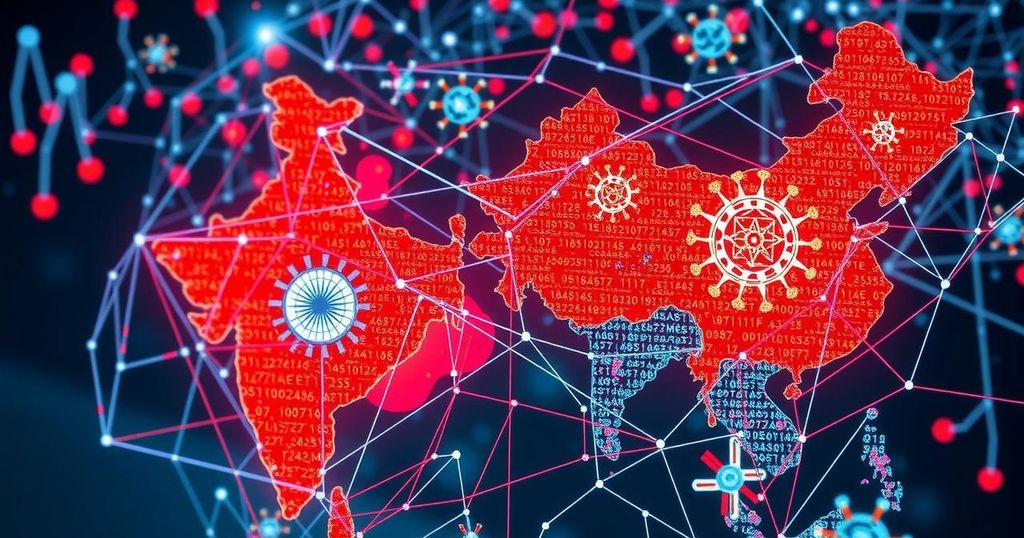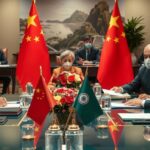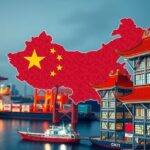Economy
Politics
ASIA, BEIJING, BR, CHINA, DONALD TRUMP, ECONOMY, EUROPE/ASIA, FOREIGN INVESTMENT, GEOPOLITICS, INDIA, INFRASTRUCTURE DEVELOPMENT, MEXICO, MI, MIHIR S SHARMA, NA, NARENDRA MODI, NORTH AMERICA, RUSSIA, SOUTHEAST ASIA, TRADE, UNITED STATES, US, WANG YI, WHITE HOUSE, XI JINPING
Nia Simpson
The Interdependency of India and China: A New Economic Paradigm
India and China have resumed dialogue, signaling a potential thaw in relations amidst ongoing border tensions. Both nations are currently grappling with economic slowdowns, which has prompted a reconsideration of their trade relations. India’s dependency on Chinese imports has grown, revealing an inextricable economic connection that may necessitate collaboration despite political discord. The challenges of rebuilding trust and forging economic ties persist as both nations navigate these complexities together.
In a significant diplomatic development, India’s National Security Advisor engaged in talks with Chinese Foreign Minister Wang Yi, marking their first meeting since 2019 amidst ongoing border tensions. This resumption of dialogue signals a potential thaw in relations, reflecting an understanding reached by Prime Minister Modi and President Xi during the BRICS summit. While the two nations remain entrenched in territorial disputes, their mutual economic concerns amid growth slowdowns are reshaping their engagement.
Both nations find themselves navigating economic uncertainties. China’s economy grapples with the aftereffects of a weakened real estate sector, while India’s policymakers experience mounting pressure to enhance domestic job creation amidst sluggish growth. The ongoing trade dynamics illustrate that India remains heavily reliant on Chinese imports, particularly in vital sectors such as electronics. The backdrop of rising trade deficits has prompted Indian officials to reconsider their approach towards China.
The Indian government previously sought to curtail its dependence on Chinese goods post-2020, but paradoxically, trade relations deepened in crucial segments. Items like electronics, increasingly produced in India, have unveiled a broader supply chain interdependence between the two nations. This realization is causing Indian authorities to acknowledge that progress towards self-sufficiency might necessitate collaboration within existing supply chains dominated by China.
For India’s economic aspirations to materialize, engaging with China’s established manufacturing capabilities becomes imperative. Greater Chinese investment could foster innovation within India’s manufacturing landscape. However, bilateral cooperation hinges on stability along their contentious border, indicating that improved relations are crucial for mutual economic benefit. With both countries seeking growth while acknowledging their divergent goals, they recognize the merits of cooperation despite existing political tensions.
As both economies maneuver through significant challenges, the path toward normalcy is fraught with complexities. India desires increased Chinese investment and access to essential inputs, while China seeks to expand its market presence amid a politically charged international landscape. Despite these differences, the economic realities compel both nations to engage in dialogue and potential collaboration, suggesting a cautious yet optimistic approach toward their intertwined futures.
The relationship between India and China is historically complex, characterized by both cooperation and contention. Recent border skirmishes have exacerbated tensions, causing a significant strain on diplomatic relationships. However, as both nations face economic slowdowns, the need for collaboration in trade and investment is becoming increasingly apparent. The ongoing discussions between high-level officials signal a potential shift towards normalizing relations, driven largely by economic incentives rather than merely geopolitical concerns.
In conclusion, the evolving dynamics between India and China highlight an urgent need for economic cooperation amid a backdrop of political tensions and territorial disputes. As both nations grapple with economic stagnation, acknowledging their interdependence could serve as a catalyst for improving relations. Strategic engagement in trade and investment becomes essential for mutual growth, although underlying political complexities persist. The balancing act between economic collaboration and strategic sovereignty remains a defining challenge for both countries going forward.
Original Source: www.business-standard.com








Post Comment